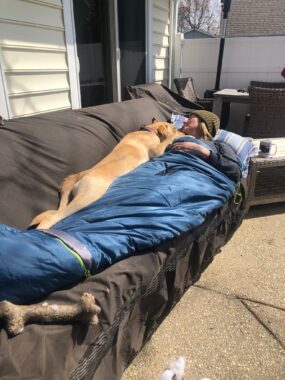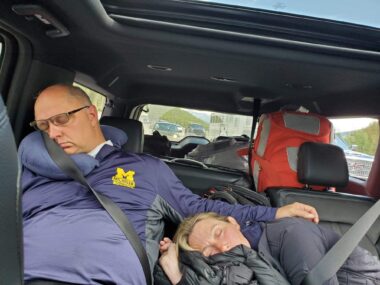Caregiving for my late husband often left me feeling helpless
We can never fully prepare for the reality of ALS
Written by |

I remember the first time my late husband, Jeff, fell as a result of ALS. Falls can be common with the disease, but I was still shocked each time one happened. When Jeff fell, it laid bare how ill qualified I felt to care for him, even while taking every precaution to keep him safe.
On this day, we were at an outdoor gathering of friends, relatively early after Jeff’s diagnosis. He was still walking without assistance and tripped on a single step, tumbling swiftly to the ground. My immediate instincts were twofold: to run and help, and to look for someone who knew what to do.
The latter reaction was more revealing because I realized I was, in fact, that person. The friends who’d witnessed Jeff’s fall were, understandably, looking at me. It dawned on me in that moment that, even just a few months since his diagnosis, I was indeed his caregiver.
Had I not been so concerned about Jeff’s fall (he was OK), I would’ve been bemused. Not by the fall, of course, but because I was meant to know what to do, and that I was somehow qualified to be in charge.
No amount of preparation can halt ALS progression
ALS left me feeling woefully unprepared for every physical and emotional insult it hurled at us. When Jeff was diagnosed, I became an ardent learner, willing myself to be obsessively accountable. What I discovered instead, after 19 months of caregiving before Jeff died, is that ALS was a brutal teacher. It leveled me and challenged me. It required me to bring my best and still usually left me feeling helpless and defeated.

Juliet Taylor naps during a break from caregiving for her late husband, Jeff Sarnacki, in spring 2020. (Courtesy of Juliet Taylor)
I remember starting a comprehensive binder of data when we were in the process of seeking answers to Jeff’s troubling symptoms. I dutifully carried the binder to every appointment, every test, every discussion. I recorded his temperature, blood pressure, and mood, as well as every comment his care team made, even though these were already documented in his online medical chart. I recognize that now as an attempt to manage my own anxiety, somehow feeling that we could overcome our fear with data and information, even when they pointed to a scary outcome.
Once Jeff was diagnosed, I enrolled in a weekend certified nursing assistant program at our local community college. Even though I already had a full-time job and Jeff was still functioning well physically, I dove into learning about bed baths, Hoyer lifts, and CPR. As part of the program, I worked for a week in a nursing home. I sought to absorb every bit of medical knowledge that I could.
While I’m now grateful to have gained this knowledge, in retrospect I realize that this effort, too, was trying to prepare for something that’s simply impossible to fully prepare for.
Caregiving tapped into my most primal feelings of helplessness and unfairness. The person I loved most in the world was facing a terminal illness, and no amount of wishful thinking, bargaining, or education would change that.
That’s why I was surprised to see so many faces looking at me when Jeff fell for the first time. I felt ineffective and alone, an unlikely and questionable expert. I could assist Jeff to his feet, yes, but I couldn’t keep a fall from happening again. Nothing would stop his progression, and no amount of preparation would mitigate what came next.

Jeff Sarnacki and Juliet Taylor nap in the car during a vacation to Canada in June 2019. (Courtesy of Juliet Taylor)
I’ve written before that Jeff and I had bountiful support from family and friends while he lived with ALS. Loved ones visited frequently, brought meals and laughter, and kept us company.
Even still, there were so many frightening moments of reckoning with ALS that were private to just him and me. There were overnight breathing scares, urinary tract infections, unexplainable pains, unfixable discomforts, nightmares, and communication challenges once Jeff lost the ability to speak. These were fears we bore both alone and together, and sadly, these weren’t things that preparation would solve.
I think about my “job performance” as Jeff’s caregiver all the time. Even more than four years after his death, I second-guess my decisions and my care. I wonder what I could’ve done differently.
Yet I know better. For a time, I devoted my life completely to providing a dignified, safe, peaceful, and meaningful life to the person who had always brought those same things to me. I strive to give myself grace. As we observe National Family Caregivers Month, I wish the same for any family that is living with this thief of a disease or reeling from the losses it creates. This community sees you, and you are doing a good job.
Note: ALS News Today is strictly a news and information website about the disease. It does not provide medical advice, diagnosis, or treatment. This content is not intended to be a substitute for professional medical advice, diagnosis, or treatment. Always seek the advice of your physician or other qualified health provider with any questions you may have regarding a medical condition. Never disregard professional medical advice or delay in seeking it because of something you have read on this website. The opinions expressed in this column are not those of ALS News Today or its parent company, Bionews, and are intended to spark discussion about issues pertaining to ALS.






Vanessa
Thank you for sharing your experience, Juliet. I needed this today. I’m trying to care for a good friend (no spouse, no family) and it’s both heartbreaking and the most challenging thing I’ve ever tried to do.
Mary Cunningham
Thank you, Juliet, for sharing your story. Each one of us has our go-to coping strategies. I relate so much as a caregiver for my husband who is 12 months into a fast-progressing diagnosis of ALS> I'm a person who likes binders, taking notes and doing anything to feel prepared and "ready" - which is, as you share, impossible to achieve with ALS. I anticipate the self-doubt and questioning in the future and take solace in your words about doing our "best" and your core values of striving for dignity, safety and peace for your husband.
Christie Addy
This is exactly how I felt. I still have many regrets that I didn't "DO ENOUGH" for my husband. I try to give myself grace, but only give myself more stress and tears. He passed away in April, and the holidays are coming--Christmas was his favorite.
John and I loved to travel, especially on cruises. My life is empty without him. I HATE ALS!
Robert Sallitt
Dear Juliet, as I read your article, I could anticipate the next words and lines. Six years after losing my wife to ALS I still struggle with thoughts of what I could have done better; she needed better, she deserved better. I know she appreciated my efforts and that provides comfort, but still…..
To all caregivers out there, do your best, ask for help before you need it and know your efforts are seen and appreciated.
Beth Crystal
Juliet, I can only say from reading this that you are a beautiful and compassionate person! Jeff was blessed to have you. Everyone who is diagnosed with this "thief of a disease" needs someone like you to care for them.
Cathy Russell Miller
I just read this article.
My Husbond was diagnosed a year and half ago as this is November 2024.
Thank you for this writing because it did help me.
We are due to go to our ALS clinic Mobile AL Jan 12 2025.
I plan to ask our dr about home health care and hospice.
Patrick my Husbond , is now on Walker cannot walk at all without it. I just bought a wheelchair as do t think he will be able to use Walker much longer.
My back is in bad shape from helping him up after a fall and he has had several. It scares me so much when he falls, as he also usually is hurt from the falls.
I don’t have family or my close friends here in Orange Beach AL as they are 6 hours away. But do hv friends that are helping me just by listening. I pray every day that God will heal Patrick and if it’s not his will I ask for strength for me to handle taking care of him. It’s a 2 full time job or more. We also have his Jack Russell dog that is 15 years old so I take care of it as well.
I am so exhausted and tired work out that I don’t feel like cooking an house work as cleaning it etc like I use to.
We have cameras all over our condo so if I am out to run errands I can check on Patrick from my phone. This is a great tool to give me peace of mind.
We are having our master bath Redon to have a roll in shower and it’s costing so far 15,000.00, of our retirem savings to do this. We like so many live on a budget and the equipment plus meds our ins not paying for all of it.
If anyone here has any ideas that we can get help in our home like someone to come in few to times a week to helping us financial . We have insurance but we have Advantage and it only pays 80%, so 20% is a lot when you are on budget and this bathroom is costing twice as much .not asking help there but hoping someone will see my writings to help others.
Thank you
Cathy Miller
Orange Beach AL
Terry Sigdestad
I have a caregiver 9-1 5 days a week. It give my family and I a break. It’s worth it
heather
Thank you for writing this Juliet, and so beautifully. I often struggle to put my emotions into words, but I could really identify with yours. It is incredible to be thrust into a role nothing could prepare you for. I admire your dedication to trying to get prepared, even spending a week in a nursing home and taking a course in nursing, you certainly tried very hard.
Our ALS journey began 5 years ago, so the one thing I've had that most others in our position (the somehow lead caregiver) do not, is time.
Not so much time to learn, because most of what I've learned I've forgotten before it's even been helpful and I only have to re-learn, but time to process the news and the losses thus far. I can't imagine having it all rolled into 19 months, that's blow after blow and I'm sorry you went though that. Thank you again for being brave and vulnerable for sharing, it makes me remember that I am not the only one who knows this massive struggle and to try show myself some self compassion, I hope you do too.
Elissa
Thank you for taking the time to share your experience. Three weeks ago I lost my husband, Michael, 18 months after his ALS diagnosis. I am tortured by guilt that I didn't do enough, didn't make the right decisions, wasn't patient enough, endless reasons.
Kera
Thank you for sharing your story. I’m reading this thru tears. I just lost my husband about a month ago after watching him battle a little over a year. After losing my soulmate, I am completely hollowed out alone, and I pray that I can find comfort, knowing that I’m not alone by having people out there with the same experience. I pray everyone finds peace and comfort.
Julie Taylor
I have never felt a story more, especially since our names are so close. My husband was diagnosed in June and already in a power chair, I am feeling helpless also as if it wasn’t for friends and family we would not be anywhere near where we are today. It is such a fast progression for us & I feel as if regular people are just left to fend for themselves to find answers to all the challenges ALS brings. Thank you for sharing your story ❤️